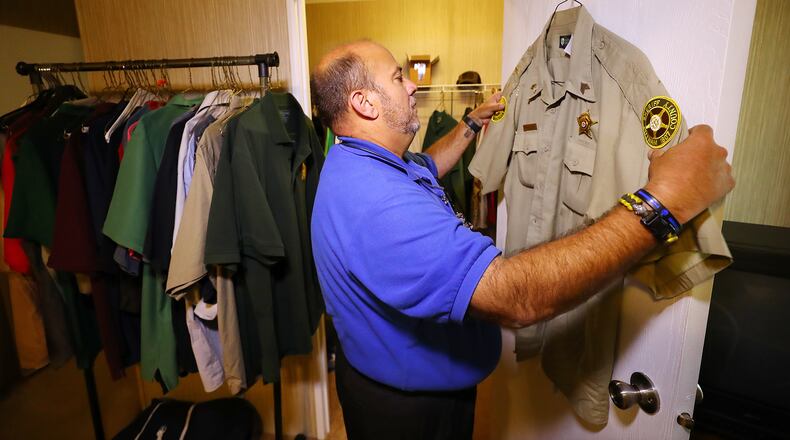As communities across Georgia try to contain a surge in violent crime, law enforcement agencies are also struggling on another front: attracting and retaining enough officers to carry out their public safety mission.
The high stakes of the shortages were made clear in a harrowing episode this month in Pulaski County.
Five inmates with violent histories escaped from the county jail, as a shortage of jailers contributed to a breakdown in security, said Sheriff Danny Brannen. The jail in Hawkinsville typically needs four jailers per shift to monitor the close to 40 inmates under its roof. But the evening of the escape, Nov. 12, only two jailers — both women — were on duty.
Late that night, the inmates isolated one and overtook the other, locking both women in a cell. The inmates stole Tasers and took car keys from one of the jailers, fleeing in her personal vehicle. The escape shook the community and resulted in a five-day manhunt that brought in local, state and federal authorities before all five inmates were recaptured in Houston County.
“It was very unsettling,” Brannen said.
Across Georgia, law enforcement agencies report fewer and fewer people are applying to be law enforcement officers, and agencies are struggling to maintain the workforce they have. In part, that’s due to the pandemic and the labor shortages it created across many industries. But these pressures collided with fallout from the death of George Floyd in May 2020, which promoted protests and heightened scrutiny of officers’ actions across the country.
All of it has led to law enforcement becoming a less attractive profession, many officers and leaders say.
“I’ve been in law enforcement 31 years, and I’ve never seen this many people leave the profession altogether,” said Chatham County Police Chief Jeffrey M. Hadley, whose agency of 122 officers is facing about a 20% vacancy rate.
Public records back that up. More officers have retired so far this year — 1,105 — than in any year over the past six, according to data of the Georgia Peace Officer Standards and Training Council, the state law enforcement certification agency.
What’s more, last year, 3,280 officers allowed their certifications to lapse or be removed, the highest total over a five-year period, according to P.O.S.T. data. And fewer officers received new certification last year — 1,852 — than at any point over the same period, and this year looks like the number of new certifications will be lower still.
Credit: Curtis Compton / Curtis.Compton@
Credit: Curtis Compton / Curtis.Compton@
“I know almost every agency I deal with, any chief I talk to, is trying to hire people,” said Chris Harvey, deputy director of P.O.S.T.
Law enforcement agencies have had to step up recruiting and offer incentives competitive with those offered by other employers, but they are limited by government budgets and the pressure to keep taxes low.
Public safety at issue
The surge in violent crime in communities throughout the state has put new pressure on police to do more to combat crime, as questions intensify from the public about why they don’t see more officers on patrol.
“When there’s a police shortage it puts the community at a public safety risk,” said Pastor Michael White, who is part of a group of Black ministers in Albany who are concerned about a spike in violent crime and a shortage of police in the southwest Georgia city.
The city recently had 50 vacancies in the 200 officer department. Chief Michael Persley said it’s been tough to find enough qualified people who want to do the job, and he’s had agencies in metro Atlanta poach his officers. Still, he’s not going to lower standards.
“If I hire just anybody as a police officer then I’m hiring lawsuits and problems for the city,” he said.
In Clayton County, the police department is authorized for 394 positions, but 55 of those spots are vacant. The Fulton County Sheriff’s Office has roughly 1,000 positions and 170 are vacant. Fulton Sheriff Pat Labat’s office is losing three to five people per week, either to retirement or other agencies. Labat is actively recruiting and offering a $9,000 signing bonus for deputies and detention officers who give a three-year commitment.
Credit: Curtis Compton / Curtis.Compton@
Credit: Curtis Compton / Curtis.Compton@
The Atlanta Police Department has acknowledged the concerns across the community about short staffing, but says there are signs those problems are turning around.
The department saw 121 resignations in 2020 — twice the total from 2019 — and 53 retirements. But the agency said it has seen resignations slow down and new applicants increase recently. While it hasn’t reached its staffing goals, the department streamlined some hiring processes and added more positions to help in its background and recruitment unit.
“The good news is we are still standing, and we have found our footing,” the agency said in a recent statement. “We are on the right road and making progress.”
Macon also is struggling with staffing shortages amid modern records for homicides the past two years. At the same time, Bibb County Sheriff’s Office is more than 100 deputies short of its goal of 500 sworn personnel.
“I've been in law enforcement 31 years, and I've never seen this many people leave the profession altogether."
The impact of the shortage are felt across the agency, adding to the stress on staff who remain.
Some administrative deputies have had to pick up road shifts to help cover the shortage. Detectives have been forced to take on heavier caseloads than Bibb Sheriff David Davis would like.
Response times to minor crimes have suffered, but so far the shortage hasn’t impacted the agency’s ability to respond to emergencies and serious crimes, Davis said. There have been peak periods, however, when they’ve come close to being overwhelmed with serious incidents.
“Fortunately we haven’t had that happen too many times,” he said. “We’ve come close.”
After the escape, Pulaski County is facing a similar situation. Sheriff Brannen is also short of deputies who police the community, but now he’s having to pull some off the road at times to assist jailers, until he gets more detention center staff. One of the jailers detained by inmates in Pulaski County told Brannen she’s not coming back. He hopes a new raise of $3 per hour, which will bring hourly pay for jailer’s to $13, will help.
Even suburban areas are scrambling to fill openings. Earlier this month, Smyrna raised police wages 28% to try to attract more recruits.
While it’s tough to measure, public safety suffers when there are critical shortages of officers over an extended period, said Butch Ayers, executive director of the Georgia Association of Chiefs of Police, who for years served as chief of Gwinnett police. Lower police visibility creates openings for criminals and lowers public confidence, he said.
“Are you creating that atmosphere where the criminal element feels more at ease because they don’t have a patrol car around?,” Ayers said. “You have less proactive policing, more reactive.”
Search for solutions
Challenges in Georgia mirror national trends. The Police Executive Research Forum (PERF), a Washington-based group, released results of its police workforce survey in June. The group examined agencies across the country and found fewer officers were being hired and resignations and retirements had increased during the first year of the pandemic.
A big struggle for chiefs everywhere was finding qualified applicants to fill their new recruit classes, said Chuck Wexler, PERF’s executive director.
“If we are not able to figure out a way to attract the next generation of police officers we will definitely see an impact on public safety,” he said. “We’ve seen police overcome challenges in the past, but we’ve never seen it like this.”
The Georgia Association of Chiefs of Police has tasked a committee to examine attrition rates and get at some of the root causes for officer departures. The committee has partnered with researchers from the University of Georgia to survey more than 3,000 officers across the state about their views of the job.
Some preliminary results suggest that a significant number of officers don’t necessarily see a long-term career within their agencies. There’s also a correlation between views of job satisfaction and the prevailing opinions about police in the communities they serve. Support from their supervisor also plays a central role to job satisfaction, the survey has found.
“When there's a police shortage it puts the community at a public safety risk."
The association hopes to conduct an anonymous survey of officers who have left agencies to further drill down on why there’s been an exodus from some agencies, said Americus Police Chief Mark Scott, who is heading up the effort. Scott said a growing number of agencies are starting to provide support to officers to manage work-life balance and make it easier for them to stay on the job. His agency required every officer to go to counseling over the past year, hoping to remove the stigma for officers who may need extra support, he said.
“Most of the officers who have left me in the past two to three years they’ve either gotten burned out because we’re short (staffed) and we have to work them so much or a lot of them have to leave for family issues,” he said.
But the issues may go beyond what any one agency can address. Putnam County Sheriff Howard Sills said that whenever a controversial video or incident surfaces, negative sentiments toward law enforcement ricochet across the media landscape. The climate created by this has left some officers fearing their career could being ruined, and they could lose everything for just doing their jobs, he said.
Earlier this month, after two officers were shot and killed in separate incidents the week after two others were indicted in Fulton County for fatally shooting a man, Sills fired off a text to colleagues across Georgia.
“That’s just 10 days in Georgia,” he wrote. “Wonder why our officers are resigning and retiring? Wonder why we can’t hire new officers? Georgia and this country better wake up soon!”
Credit: Curtis Compton / Curtis.Compton@
Credit: Curtis Compton / Curtis.Compton@
Sills’ agency has 35 sworn deputy positions, but close to a third are vacant. Sgt. John Harper turned in his uniform and badge to Sills this month, working his final shift the week before Thanksgiving.
Harper, 56, has done about every job in the agency, from road deputy to detective to head of courthouse security. Harper said the day-to-day stress of the job had started to take a toll on him the past couple years, as did the national climate of negativity toward law enforcement.
The recent death of Harper’s father pushed him over the edge. At the funeral, he saw his two daughters get emotional at the site of their grandfather in a casket, and the vulnerabilities of the job Harper has performed for 31 years hit close to home.
“Watching my daughters crying, I thought of me laying in there instead of my dad,” Harper said. “What would they be doing if I stopped somebody to help change a tire and they shot me?”
About the Author
The Latest
Featured






